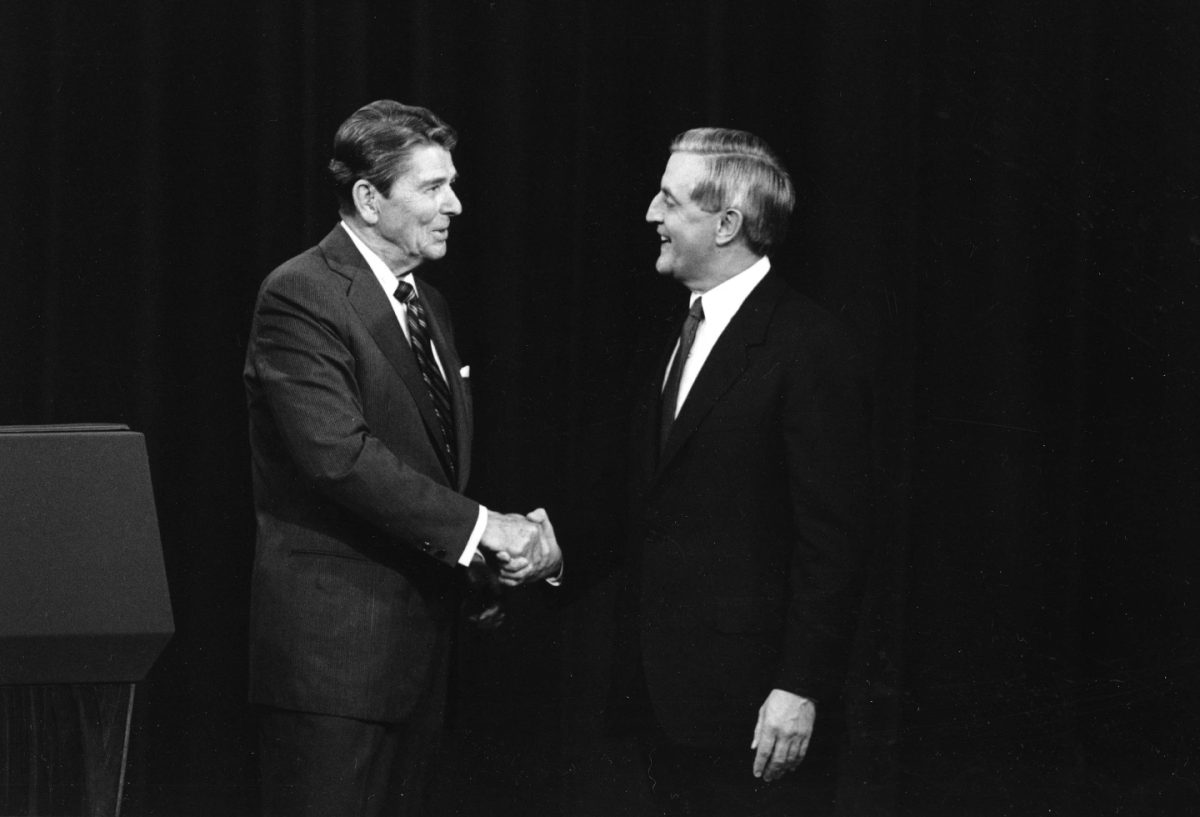The recent debate between Presidential candidates Vice President Kamala Harris and former President Donald Trump was rife with contempt from both sides. What the debate lacked in concrete policy and specific plans for the future was made up for with insults and degradation of personal character. The most surprising fact, however, was the complete lack of surprise from viewers. This was pretty much expected.
In today’s day and age, political figures are defined less and less by policy and, rather, more and more by personal character. The debate floor on Sept. 10 displayed one candidate as seemingly devoid of policy, aside from a firm stand on reproductive rights, and one candidate whose platform is almost solely based on overzealous fearmongering and remarks made, seemingly, for the sole purpose of going viral on Twitter. All this being said, charisma voting is really nothing new.
During the Reagan-Bush era, the “Would you get a beer with them?” hypothesis seemed to determine ballots just as much as policy did. People have always voted for who they like. However, politics has never been as harmful or as polarizing as it is today. The “boring politician” is a figure that is necessary for a functioning democracy, yet is something that is sorely lacking today.
The first nationally televised presidential debate took place between Richard Nixon and John F. Kennedy in September of 1960. Despite the same medium, that debate was strikingly different from this past week. Candidates took opportunities to compliment each other and their policies. They often agreed on specific issues, and when they disagreed, it was out of differences in policy, not personal attacks.
Nixon himself stated during this debate that the two candidates were like-minded in their goals for this country, it was simply the means to that goal that differed. Compare this to the past week’s debate — things could not be more different. Politics are not what they once were, and this is for a few key reasons.
There are now more voices than ever clamoring for their own personal or group needs to be addressed. The modern-day liberals, the self-touting protectors of welfare and DEI, have to pack myriad social stances under one umbrella. If you support progressives for their stance on reproductive rights, you now have to support their environmental funding and their swollen welfare programs or foreign relief efforts.
Issues have become so split along party lines that each party has to cram far too many stances under one candidate. There are a million needs, and there are only two groups to cater to those. Modern-day politicians are now forced to take stances on issues that were less politically oriented decades previous. While this causes confusion and complication, it is not inherently a bad thing.
More voices with more issues is not necessarily indicative of a country failing, but of more voices being platformed. Presidents like JFK were able to campaign on issues almost exclusively catered to the middle-class white families of America, and it worked. Modern-day America has a larger platform for diverse voices than it ever has, but it also makes party agendas a confusing heap of issues.
For this reason, modern-day campaigns have been largely stripped of policy so as not to alienate key demographics needed to win an election. Harris pushes for a drastic cut in taxes for the middle class, and in doing so, risks losing the vote of voters keen on expanded welfare. The modern-day MAGA GOP is but a shell of its former self. Bureaucratic policy has been reduced to slogans used to whip radical supporters into a fearful frenzy. Support for domestic industry has transformed into immigration fear-mongering. “Build factories” has become “build a wall.”
This confusion leads to debates boiling with sizzle, but the viewer is left sans filet. Politicians, lacking in substantial policy, have to resort to character attacks and pandering. Harris can ill afford to attack Trump’s radical stances as she risks opening up her own agenda to attacks on its clear dearth of real substance.
Politics is not a place for personal expression or radical action. A boring government is usually indicative of a prosperous society. Turning off a presidential debate because it’s lulling you to sleep probably means that the country is doing fine. Turning off a presidential debate because of anger or fear is probably representative of a deeper issue with our nation. Trump has become almost a caricature of himself, but in a world of confusion en masse, his simplicity is a relief to many.
Ironically, both candidates are doing an excellent job of representing their parties. Current election chaos is representative of our own chaotic country. Political parties must return to platforms constructed from clear and simple policy, and candidates need to campaign on this platform alone. Government needs to be boring, and candidates need to express their individuality through other means, but charisma is important, and likeability wins elections. A candidate passes the beer test by being likable yet also bland. Bring back boring politics and bring back boring politicians.









Owen Benner • Oct 9, 2024 at 12:29 am
this is wack bro, yap sesh ♂️